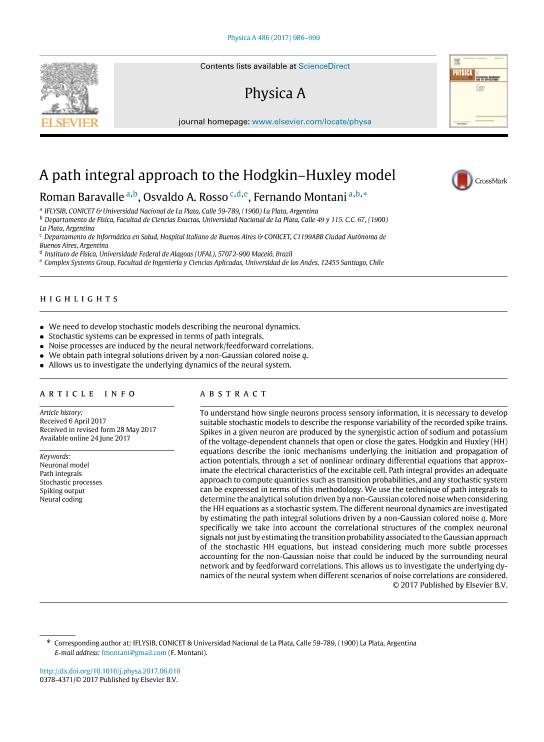Mostrar el registro sencillo del ítem
dc.contributor.author
Baravalle, Román

dc.contributor.author
Rosso, Osvaldo Aníbal

dc.contributor.author
Montani, Fernando Fabián

dc.date.available
2018-11-02T18:30:59Z
dc.date.issued
2017-11
dc.identifier.citation
Baravalle, Román; Rosso, Osvaldo Aníbal; Montani, Fernando Fabián; A path integral approach to the Hodgkin–Huxley model; Elsevier Science; Physica A: Statistical Mechanics and its Applications; 486; 11-2017; 986-999
dc.identifier.issn
0378-4371
dc.identifier.uri
http://hdl.handle.net/11336/63523
dc.description.abstract
To understand how single neurons process sensory information, it is necessary to develop suitable stochastic models to describe the response variability of the recorded spike trains. Spikes in a given neuron are produced by the synergistic action of sodium and potassium of the voltage-dependent channels that open or close the gates. Hodgkin and Huxley (HH) equations describe the ionic mechanisms underlying the initiation and propagation of action potentials, through a set of nonlinear ordinary differential equations that approximate the electrical characteristics of the excitable cell. Path integral provides an adequate approach to compute quantities such as transition probabilities, and any stochastic system can be expressed in terms of this methodology. We use the technique of path integrals to determine the analytical solution driven by a non-Gaussian colored noise when considering the HH equations as a stochastic system. The different neuronal dynamics are investigated by estimating the path integral solutions driven by a non-Gaussian colored noise q. More specifically we take into account the correlational structures of the complex neuronal signals not just by estimating the transition probability associated to the Gaussian approach of the stochastic HH equations, but instead considering much more subtle processes accounting for the non-Gaussian noise that could be induced by the surrounding neural network and by feedforward correlations. This allows us to investigate the underlying dynamics of the neural system when different scenarios of noise correlations are considered.
dc.format
application/pdf
dc.language.iso
eng
dc.publisher
Elsevier Science

dc.rights
info:eu-repo/semantics/openAccess
dc.rights.uri
https://creativecommons.org/licenses/by-nc-nd/2.5/ar/
dc.subject
Neural Coding
dc.subject
Neuronal Model
dc.subject
Path Integrals
dc.subject
Spiking Output
dc.subject
Stochastic Processes
dc.subject.classification
Astronomía

dc.subject.classification
Ciencias Físicas

dc.subject.classification
CIENCIAS NATURALES Y EXACTAS

dc.title
A path integral approach to the Hodgkin–Huxley model
dc.type
info:eu-repo/semantics/article
dc.type
info:ar-repo/semantics/artículo
dc.type
info:eu-repo/semantics/publishedVersion
dc.date.updated
2018-10-22T21:51:46Z
dc.journal.volume
486
dc.journal.pagination
986-999
dc.journal.pais
Países Bajos

dc.journal.ciudad
Amsterdam
dc.description.fil
Fil: Baravalle, Román. Consejo Nacional de Investigaciones Científicas y Técnicas. Centro Científico Tecnológico Conicet - La Plata. Instituto de Física de Líquidos y Sistemas Biológicos. Universidad Nacional de La Plata. Facultad de Ciencias Exactas. Instituto de Física de Líquidos y Sistemas Biológicos; Argentina
dc.description.fil
Fil: Rosso, Osvaldo Aníbal. Instituto Tecnológico de Buenos Aires; Argentina. Consejo Nacional de Investigaciones Científicas y Técnicas; Argentina. Universidad de Los Andes; Chile
dc.description.fil
Fil: Montani, Fernando Fabián. Consejo Nacional de Investigaciones Científicas y Técnicas. Centro Científico Tecnológico Conicet - La Plata. Instituto de Física de Líquidos y Sistemas Biológicos. Universidad Nacional de La Plata. Facultad de Ciencias Exactas. Instituto de Física de Líquidos y Sistemas Biológicos; Argentina
dc.journal.title
Physica A: Statistical Mechanics and its Applications

dc.relation.alternativeid
info:eu-repo/semantics/altIdentifier/url/http://www.sciencedirect.com/science/article/pii/S037843711730657X
dc.relation.alternativeid
info:eu-repo/semantics/altIdentifier/doi/http://dx.doi.org/10.1016/j.physa.2017.06.016
Archivos asociados
